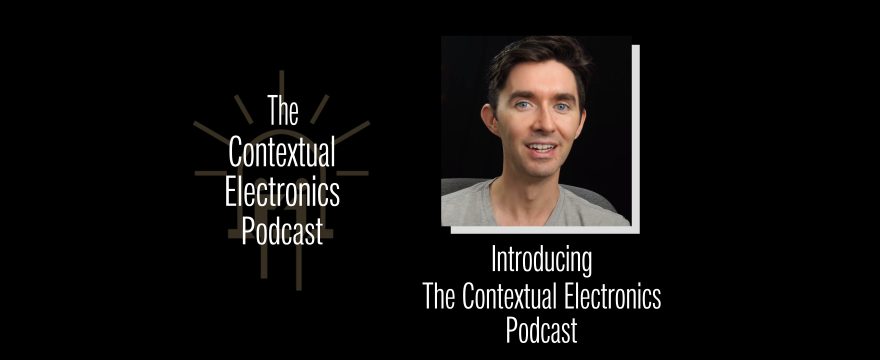I started Contextual Electronics (CE) in 2014 to teach electronics by pairing theory and practice. We sometimes refer to this as “the online electronics apprenticeship”, since our members follow along with electronics builds. Since then, hundreds have participated in project based education to improve their skills. In 2020, we’re looking to feature people using electronics in their everyday work. This is a new podcast called, The Contextual Electronics Podcast. Listeners/viewers will gain a better grasp of required knowledge for their personal projects and how to work towards it. This will bring more context to your practice.
How did we get here?
Podcasting isn’t new for me. Contextual Electronics started as the direct result of another podcast, The Amp Hour. Feedback from Amp Hour listeners helped me realized there was a need for a program such as CE. I designed a project based course that pairs theory and practice. Over time, the course and this site have changed. CE started as a 10 week course teaching electronics; then it split out into two 8 week courses instead. Then we released all of our KiCad videos online and kept releasing new ones to the public for teaching people how to use an open source EDA program. Then we moved on to doing smaller boards for more rapid feedback on designs. Then we did a larger project to pull in firmware and build up a system. Then we developed a shortcourse that highlights swappable design. Then we started a public forum to complement the coursework. Most recently, we have been designing an advanced course that shows how to design a board that has bluetooth and cellular capabilities. We hope that the podcast is the next iteration. A free weekly podcast, highlighting guests who pair electronics theory and practice every day. We hope this will help more people discover the world of electronics.What will the show be like?
The Contextual Electronics Podcast (CEP) will invite guests on from all parts of the industry. We are looking to feature people at different points in their careers, and with very different backgrounds. Ultimately we want to add context to the world of electronics. Hearing or watching people with different backgrounds than your own, and those who are struggling or have struggled with electronics concepts, should help you realize you’re not alone in your learning. This podcast will include video, which is new for me on podcasts (The Amp Hour is audio only). Electronics and the education surrounding it is visual by nature; that’s why Contextual Electronics is primarily a video course. We hope that a video podcast will help to give a better view into our guests’ experiences. We will always try to make sure we describe what is on screen so that it’s possible to listen to the podcast, if that’s your preferred way of tuning in.How can you tune in?
The best away to make sure you don’t miss any episodes is to subscribe! Here are some places you can find the podcast, either video or audio:- YouTube (video)
- iTunes (audio)
- Spotify (audio)
- Stitcher (audio)
- Overcast (audio)
- RSS
- Email (sign up in the form below)
On with the show!
We are releasing 3 episodes right off the bat, and they turned out great! Here are links to the show notes and the video and audio versions of the podcast. The videos will be released on YouTube publicly over the next few days (to save peoples’ notifications), but you can access all of the content right now using the links below.- CEP001 – Design Methodologies with Sophy Wong
- CEP002 – A DIY Pick and Place with Stephen Hawes
- CEP003 – A Hardware Design Review with Erik Larson
Please reach out!
Thanks for participating in Contextual Electronics, in whatever format that takes! If you’d like to chat with us about the podcast, you can always head over to our forum, or email us about the show at [email protected]Video version of this post:
Audio version of this post:
Podcast: Play in new window | Download
